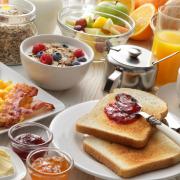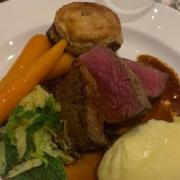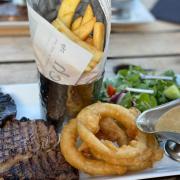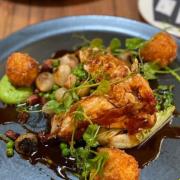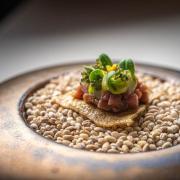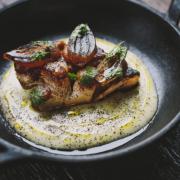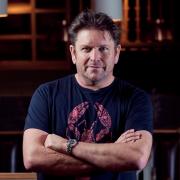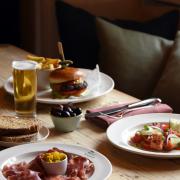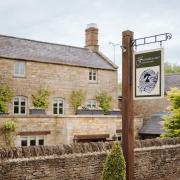The French had better look to their laurels. For Simon and Carol Weaver may live on a Cotswold farm, but their organic brie is recognised as the crme de la crme.
WHO says cows don't have character?
Not Richard Simms, that's for sure. As the herdsman on Simon Weaver's farm in Upper Slaughter, he'll regularly be out at 4.30 in the morning, leading the black and white Friesians from one of the clover and herb-filled meadows to the milking shed. "Daisy's the favourite," he says. "She was 'marded' as a calf and all she wants now is to be fussed. Whereas Rosie," he shakes his head indulgently, "awkward as a bear!"
Now the weather has grown milder, the 'girls' - to their huge excitement - have recently been let out onto the pastures of this beautiful organic farm. Talk about a hen party in Blackpool: All that's missing are the kiss-me-quick hats. "They skip and they buck and they kick their feet in the air; it's good enough to go on YouTube," Richard says. "We've certainly got some personalities here: awkward, placid, kind, nasty, jittery, bullies - every one's an individual."
It's fitting, then, that the milk they produce each day should be turned into a product with an equal amount of character: Simon Weaver's Organic Cotswold Brie.
Let's say that again... Cotswold brie?
It is, admits Simon, an oxymoron - but this is one contradiction in terms that seems to make perfect sense. It's true that this isn't Seine-et-Marne, the heart of brie country; but this cheese does, nevertheless, faithfully reflect the Cotswold landscape. This is a farm where the ridges and furrows show that farmers worked the same land back in the Middle Ages; where even the fields have names, the origins of which are lost in time: Black Nell, The Hangings, The Marshes, Kingcups; and where, down by the River Dikler, no plough has ever touched the land.
"We want our product to reflect where we come from and contribute to the Cotswolds," Simon says. "We're not producing a pungent cheese, and part of that is because we think it reflects our landscape better. We want a cheese you can eat every day - a bite of cheese with an apple or a pear: clean tasting, fresh tasting."
You certainly couldn't hope for fresher. Within minutes of Richard's 'girls' being milked, the frothy warm liquid flows a few metres along a pipe to the next-door creamery where Carol, Simon's wife, is waiting to get started alongside Michael, her assistant cheesemaker. In a four-hour process, beginning with pasteurisation, they work to produce 1,200 cheeses from 1,500 litres of milk. It's a highly skilled affair and one that couldn't be translated into an instruction sheet for just anyone to follow. Experience, intuition and almost split-second timing are among the essential ingredients.
They started three years ago. "And our first batch of cheese was perfect," says Simon. "We thought - this is so easy. Then it took us months to get back to anything like it again! You only get there by experience, and the more cheese you make, the better you are - no question about that - because you do things consistently."
And consistency is no easy task. Every batch of milk that comes in is different, depending, among other factors, on where the girls have been grazing. Part of the skill of the cheesemaker lies in ensuring that, while there will be variations, the one thing that never changes is the quality.
The farm converted to organic six years ago - and hit a problem. The high-quality organic milk they began producing was ahead of its time, and the market demand just wasn't there. These were hard times; but Simon's family is dairy farming through and through, and he and Carol were determined to keep going in some way.
"So we looked around for something to do with milk. We also wanted to get closer to the consumer - to have a product we could take control of - and cheesemaking seemed a natural progression."
They travelled all over the country, as well as to Germany and Holland, to learn the art, and decided to launch a soft cheese - partly because hard varieties take so much longer to produce, and partly because both Simon and Carol are brie fans. They're now making a tonne of cheese a week: alongside the original soft, buttery brie, they've added organic Cotswold blue-veined brie and a herb variety, and this month will see them launch a new smoked brie.
In the cheese workshops they built themselves, you can see the cheese at all stages of development. In the hot draining room, there's a constant drip, drip as the liquid runs out of the moulds, which are regularly turned; these moulds are then lowered into a brine bath to salt the cheese before an eight-day stretch in the ripening room, where you can see the white mould beginning to grow. Finally, they're all wrapped by hand in the distinctive packaging which reflects the clean purity of the cheese itself.
It's a time-consuming process, but one that is receiving just recognition. In little over a year, the cheeses scooped top prizes in the Taste of the West Food and Drink awards, and the Organic Cotswold Blue-Veined Brie won Best Organic Product at the World Cheese Awards in 2006.
"What we mustn't do is to try to compete with a make like President or similar - we simply can't," Simon says. "Our packaging costs are more than they sell their cheese for.
"The important thing is, we're a premium product and we can't be anything else."
Indeed - just try telling Rosie anything different.
You can buy Simon Weaver's cheeses at the farmers' markets in Bourton-on-the-Water (fourth Sunday), Dedington (fourth Saturday), Stow (second Thursday), Moseley (fourth Saturday) and Stroud (every Saturday) as well as from local farm shops and delis or direct from the creamery door at Kirkham Farm (on the roadside between Upper Slaughter and Lower Swell), Monday to Friday, 9am-5pm. At other times, ring 01451 870852 or visit www.simonweaver.net



